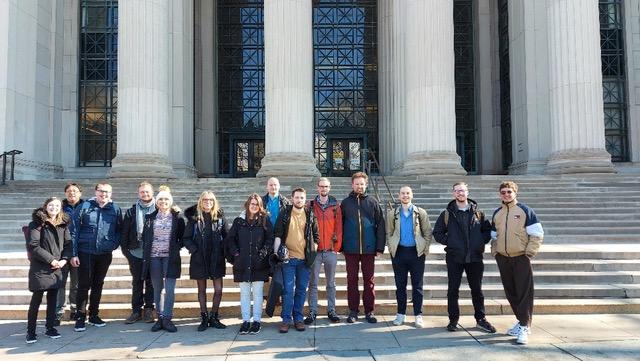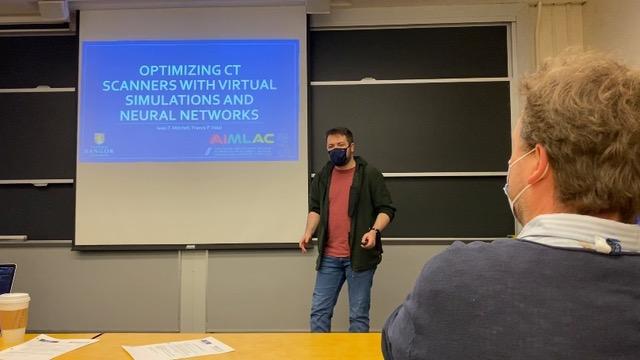PhD students travel to Boston to discuss AI (Artificial Intelligence) research
Two PhD Students from Bangor, supported by the Artificial Intelligence Machine Learning and Advanced Computing doctoral training centre, travelled to Boston to visit the Massachusetts Institute of Technology (MIT). AIMLAC is funded by UKRI (UK Research and Innovation).
Two PhD Students from Bangor, supported by the Artificial Intelligence Machine Learning and Advanced Computing doctoral training centre, travelled to Boston to visit the Massachusetts Institute of Technology (MIT). AIMLAC is funded by UKRI (UK Research and Innovation).
The group of 12 PhD Students and two academics exchanged research ideas on how AI and machine learning, and education and training in data science. Two students from Bangor, six from Swansea and two each from Bristol and Cardiff universities presented their research in talks and had meetings to discuss the application of AI and Machine Learning (ML) in scientific research as well as on the education and training of the next generation of data science/ML leaders.
The delegate group, led by Professor Gert Aarts (from the University of Swansea, and lead of the joint AIMLAC project), also visited the NSF (National Science Foundation) AI Institute for Artificial Intelligence and Fundamental Interactions (IAIFI). The group was hosted by Professor Jesse Thaler and Dr Phiala Shanahan.

Iwan Mitchell (PhD student studying X-ray reconstruction and Optimisation) said: “The time at MIT is something I will not forget easily. The topics from both AIFAI and AIMLAC were intriguing and interesting, and I had an excellent time discussing AI research with the team at MIT. Boston was a beautiful place, and we even found time to visit the local aquarium! Overall, the presented research was inspiring, and has given me many ideas for my research.”

Professor Jonathan Roberts (Bangor University lead in AIMLAC) said “This Boston trip was a fantastic opportunity for the students. The AIMLAC doctoral programme has provided opportunities far and beyond what is possible with a traditional PhD process. They have come back from this trip buzzing with excitement, and lots of new research ideas.”
Editor: J. C. Roberts
